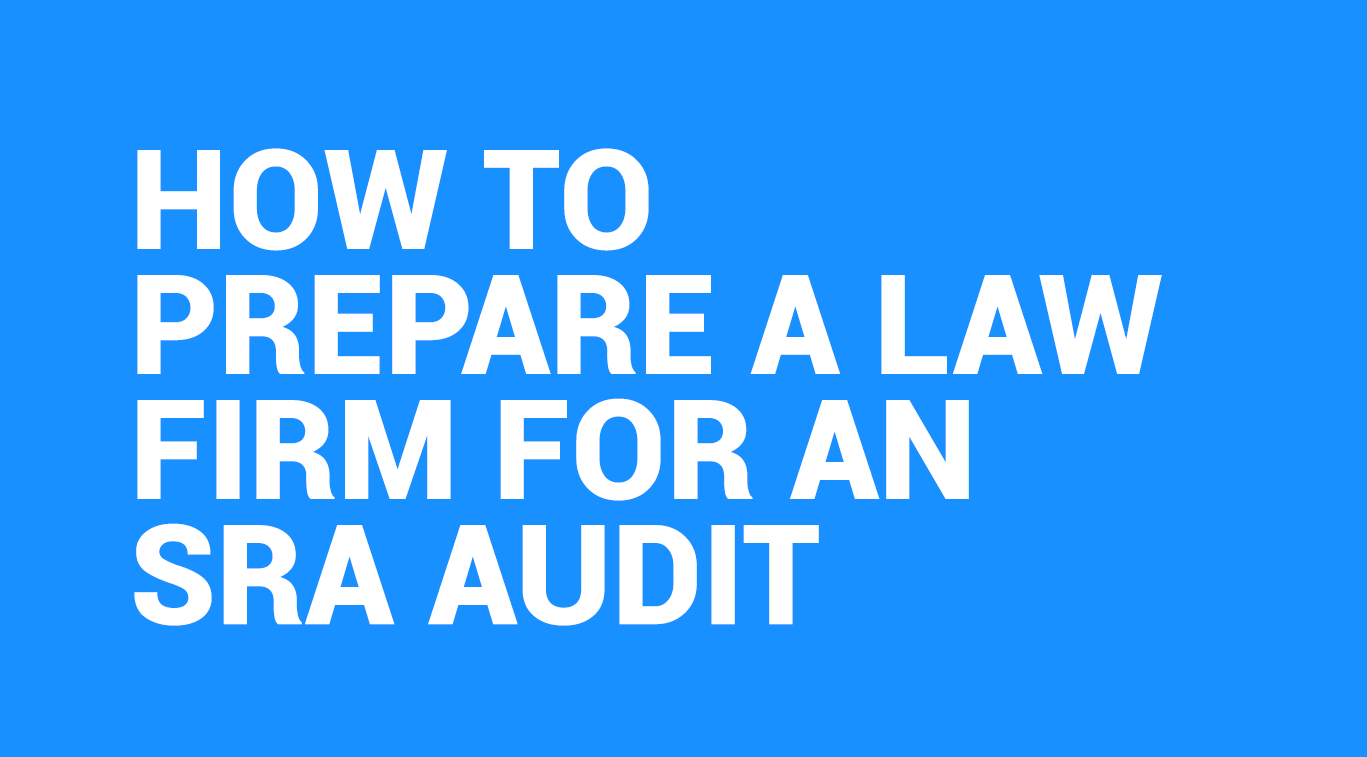How to Prepare a Law Firm for an SRA Audit

Written by Ashley McDermott
Blogger

As a law firm, you should be aware of the Solicitors Regulation Authority’s (SRA) rules and regulations surrounding audits. The SRA regulates law professionals who manage client money in England and Wales and ensures that they comply with professional standards[1].
It is always best to be prepared for an SRA audit, so don’t wait until you receive a notice from the SRA that they will be coming to review your firm[2]. Being prepared for such a visit not only shows that you take compliance seriously but can also help the process run more smoothly.
If you have never thoroughly reviewed your firm’s compliance, engaging legal tech services, also known as software for law firms, can be helpful. Not only can using technology in your law firm help you meet clients’ expectations, but it can help make preparing for an SRA audit a breeze.
Who Can Carry Out an SRA Audit?
The Solicitors Regulation Authority (SRA) is responsible for the regulation of over 200,000 law firms and solicitors across England and Wales[3]. The SRA has compiled a comprehensive set of standards and regulations which firms must comply with.
As part of their role in regulating the legal profession, the SRA routinely audits law firms to check for compliance with these standards. These checks are carried out by registered auditors, who are also members of one of the six chartered accountant bodies [4].
What Is an SRA Audit?
Ultimately, SRA audits aim to show reports on how a law firm handles client money. These audits reassure the public that law firms are keeping their money secure and foster an ethical environment in which clients can be confident in the service they receive.
Familiarising yourself with the SRA’s Code of Conduct will help you understand the requirements for running a compliant law firm and ensure you pass your SRA audit. Some points which are looked at during an SRA audit are:
- Proof there are processes in place to safeguard client money
- Firms are holding client money in the correct manner
- Evidence that any client money is being safely kept and is returned to the client, where applicable, in a timely manner[5]
Preparing Your Law Firm for an SRA Audit
Don’t be alarmed if you receive a letter from the SRA notifying you that your firm will be subject to an audit in the near future. While it can be daunting to know that your firm will be under scrutiny, automating processes using legal technology solutions can make all the difference and alleviate some of the stress.
Let’s look at some things we can do to prepare for an SRA audit.
Conduct an AML Risk Assessment
If your law firm handles client money and requires an SRA audit, it should have Anti-Money Laundering (AML) policies, controls and procedures (PCP) in place. An AML PCP shows the SRA that you have processes to protect, prevent and detect money laundering when client funds are concerned.
It is in your best interests to conduct a regular AML risk assessment, including before an SRA audit[6]. The SRA will want to see evidence of these processes and procedures, so it is essential to keep up-to-date records. All employees should have relevant training on this process and be able to easily access the AML PCP whenever they require[7].
Ensure All Client Account Records Are up to Date
One of the most critical aspects of preparing for an SRA audit is making sure that all records are up to date and easily accessible, which is another excellent feature legal business software offers. Law firms should conduct various reports regularly, not just in preparation for an SRA audit but also to ensure your firm’s financial health.
You must be able to provide appropriate records of any client money and client due diligence. These reports must show completeness and accuracy, and that money is managed in separate client accounts, known as trust accounts[8]. These accounts must be able to demonstrate the reconciliation of client funds regularly and show that money is being returned to the client promptly, where applicable.
It may be tempting to manage these reports manually, but this can be a time-consuming and error-prone process. Legal client software, such as law firm accounting and financial management software, can reduce human error and lessen the risk of any breaches.
Log All Employee Training
A law firm should conduct staff training on best practices for client communication and file management. All activity should be logged so that you can provide evidence of this to the SRA during an audit. Cloud solutions for law firms, such as Good Law Software, make this process easy with inbuilt performance features where you can review employees’ reports.
Record Any Breaches and Suspicious Activity
Another report the SRA will request when carrying out an audit is regarding any breaches or suspicious activity, so they can see how it was handled and if it should have been promptly reported. If any violations have been made or any suspicious activity detected, it must be logged, and evidence should be provided during an audit for the SRA to review[9].
Final Thoughts
Aside from ensuring your firm is organised, breaches of the SRA’s code of conduct can have serious consequences. In the last year alone, the SRA handed out over 250 fines, with the more severe cases referred to a tribunal[10]. So, it is in your best interests to ensure you are up to date and compliant with the latest regulations.
With that being said, as a law firm, you should do your best to stay on top of your PCPs and follow the best practices outlined by the SRA. An SRA audit may feel daunting, but as long as you follow processes, there is no need to worry.
Automating administrative tasks with technology like client management software for lawyers and legal practice accounting software can help to ease the burden and make audit preparation much more straightforward, saving time and money.
References
[1] SRA | Who we are and what we do | Solicitors Regulation Authority
[2] How to Prepare Your Law Firm for an SRA AML Visit – Legl
[3] SRA | How we work | Solicitors Regulation Authority
[4] Your Guide To SRA Audits – Williamson & Croft LLP (williamsoncroft.co.uk)
[5]Solicitors Regulation Authority (SRA) Audits – Hayven Hursts – Accountants in Cardiff
[6] How to prepare for an SRA anti-money laundering compliance visit | Legal Compliance Insight
[7]Anti-Money Laundering Awareness Training | ACAMS
[8] Whitepaper-HowShouldLawFirmsManageClientRetainers.pdf (cosmolex.com)
[10]Extra powers for regulators to clamp down on rule-breaking solicitors – GOV.UK (www.gov.uk)








